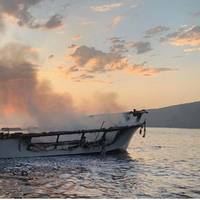US Coast Guard Announces Fire Safety Campaign for Small Passenger Vessels

The US Coast Guard has published Marine Safety Information Bulletin 05-23, Fire Safety on Small Passenger Vessels and announced a concentrated inspection campaign.The Bulletin encourages owners and operators to do a self-assessment of the fire safety of their vessels and provides a checklist evaluating fire safety and emergency preparedness on board.MSIB 05-23 also announces that the concentrated inspection campaign, which will focus on fire safety aboard small passenger vessels…
Shifting Risk
Whether it is a consent form at a hospital, a liability waiver for a team sport or a permission slip for a school field trip, many people sign risk transfer forms with only a cursory thought to what they are agreeing to. If they want to participate, they may feel they have little choice other than to go along with whatever is written on the form. But in the business world, risk transfer forms should not be signed without giving attention to the details and considering the potential outcomes. The fine print of the documents you sign or require your contractors to sign is just as vital to your risk control strategy as having good fire suppression equipment or an effective building security system.
EU-US Sign Marine Equipment Accord
The EU and the U.S. signed a mutual recognition agreement on marine equipment. Under the agreement, marine equipment certified as acceptable in the market of one party will be able to circulate in the other market without additional testing or certification. The agreement covers 30 types of marine equipment, including life-saving equipment (distress signals, rigid life rafts), fire protection equipment, and navigational equipment (GPS receivers, echo-sounding equipment). European Union (EU) Trade Commissioner Pascal Lamy, United States (US) Trade Representative Robert B. Zoellick and Ireland's Ambassador to the US, Noel Fahey signed a mutual recognition agreement (MRA) on marine equipment between the EU and the US.
Companies Merge to Form National and Marine Fire Services
Providing representation for a variety of marine fire protection equipment Canal Fire Protection, Alarm Services & Installation and Marine Fire Protection have merged to form National and Marine Fire Services. With a combined experience of more than 35 years, the trio has expertise with the servicing of vessels on the Great Lakes and the Atlantic Seaboard both in Canada and the U.S.
Unitor to Supply Bergesen LNG Newbuildings
Unitor’s Ships Equipment division has secured a contract to supply fire fighting and fire protection equipment to four large LNG carriers under construction for Norwegian owner Bergesen at Korea’s Daewoo Shipbuilding & Marine Engineering Co Ltd. All four 145,000m³ LNGCs (Hull Nos. H-2221-4) will be supplied with the following Unitor systems and equipment: · HotFoam fire extinguishing system for the engineroom · Dry Chemical Powder system for use on deck · High Pressure CO2 fire extinguishing system for special compartments · Portable fire fighting and safety equipment The contract is valued in the region of $1.5 million. Both HotFoam and the high pressure CO2 system are total flooding systems. The four Bergesen LNGCs are due for delivery in 2005 and 2006.
USCG Issues Fire Protection Equipment Requirements
All towing vessels except those in restricted services are required to comply with new requirements for fire protection equipment and procedures under an interim rule issued by the USCG. The rule is the first step in a two-pronged approach to implementing the requirements of the 1996 USCG Authorization Act, which directed the USCG to promulgate regulations requiring fire suppression systems or other measures to control fires on towing vessels. · An engine room fire detection system with visible and audible alarms. · A fixed or portable system allowing for two-way communication between the pilothouse and the engine room. · A remote fuel shutoff for the main engine and other fuel lines.
Fire Protection Rules Require Further Changes
The USCG's interim rule on fire protection equipment for towing vessels requires modification to avoid unnecessary and costly burdens on owners of existing towing vessels, AWO told the USCG. Reiterating its support for the basic suite of equipment and procedural requirements contained in the interim rule ? a general alarm, fire detection system, internal communications system, remote fuel shutoff, and training and drill procedures for crewmembers ? AWO urged the USCG to modify the technical specifications for fire detection systems and fuel shutoff valves before the October 2001 deadline for installation of such equipment. The interim rule requires a fire detection system be used for no other purpose…
Proposed Outer Continental Shelf Rules Published
After many years of work, the USCG published a Notice of Proposed Rulemaking (NPRM) for the Outer Continental Shelf Activities, 33 CFR Subchapter N, in December. This subchapter regulates oil and mineral development and production activities on the U.S. Outer Continental Shelf (OCS). It includes Mobil Offshore Drilling Units (MODU), platforms, Floating Production Systems (FPSs), and would add a host of vessels providing various support activities. A major rewrite of this subchapter was last done nearly 20 years ago and is considered long overdue because of changes in technology, particularly of the last ten years. This new proposal has…







